 Ovarian cancer researcher, Professor Anna deFazio
Ovarian cancer researcher, Professor Anna deFazio
More than 1300 Australian woman are diagnosed with ovarian cancer every year. There has been some improvement in outcomes for women with ovarian cancer over recent decades, but progress has been slow.
But thanks to new research led by scientists from The Westmead Institute for Medical Research, this is set to change.
Head of the Institute’s Gynaecological Oncology Research Group and University of Sydney Chair of Translational Cancer Research, Professor Anna deFazio said a huge barrier to improving outcomes is that ovarian cancer is currently treated as a single disease.
Now, new insights– provided by advances in genomics and molecular biology – have led to game-changing thinking, which has the potential to revolutionise the management of women diagnosed with ovarian cancer.
“Thanks to our research, and research done around the world, we now understand that ovarian cancer is a complex, diverse disease comprising multiple distinct subtypes that vary considerably in their biological behaviour and response to standard chemotherapy regimens,” Professor deFazio said.
“We now have the tools to look at ovarian cancer very differently, and what we’re seeing could transform how we treat it. As a result, things are happening quickly.”
Professor deFazio and her team are at the interface of the research bench and how that translates to clinical practice. They are part of a community of ovarian cancer researchers and clinicians from across NSW and Victoria collaborating on a new translational research program.
Their study, called INOVATe – or Individualised Ovarian Cancer Treatment Through Integration of Genomic Pathology into Multidisciplinary Care – is developing strategies to trial new targeted therapeutic drugs and treat patients according to subtypes, using new protocols for molecular testing.
According to Professor deFazio, these new insights into tumour subtypes are heralding an end to a “one size fits all” approach.
“Ovarian cancer involves a number of really complex changes. We are trying to distill that down to things we can measure and match to a treatment,” she said.
Professor deFazio and her team have already seen remarkable results for this approach. In one case study, a young woman, diagnosed with a particularly resistant strain of ovarian cancer, had run out of treatment options. The cancer had spread throughout her body and she was on morphine for pain.
Molecular testing by researchers revealed the woman’s ovarian cancer contained a mutation in a gene called BRAF – the same mutation that often occurs in melanoma. The patient was trialed on a highly effective new melanoma drug, becoming one of the first people in the world to receive this treatment for ovarian cancer.
“Almost immediately, her blood tumour marker level began to fall and, for the first time in seven years, it returned to normal.” Professor deFazio said.
“The tumour started to melt away. She’s now off pain killers and back to work.”
While Professor deFazio said this result doesn’t mean they have cured ovarian cancer, it does demonstrate a mechanism that has incredible promise.
Last year INOVATe received a five-year, $3.75 million Cancer Institute NSW grant to start implementing their research into clinical practice.
The INOVATe study involves the collection of cancer tissue and blood samples from women diagnosed with ovarian cancer, along with detailed clinical data relating to their cancer diagnosis and treatment.
Along with their standard treatment, these women will undergo molecular testing to look for categories of gene mutations.
This will enable researchers to better understand differences between individual patients and changes that may occur in their tumours over time.
A newly established online portal for the visualisation of molecular profiling results will enhance the multi-disciplinary team’s ability to tailor treatment to suit individual patients, based on the molecular characteristics of their cancer cells.
“Through this integrated and collaborative multi-disciplinary program, INOVATe will contribute to the implementation of precision medicine,” Professor de Fazio said.
“It has the potential to improve treatment of the 1,300 women in Australia and 200,000 women worldwide diagnosed with ovarian cancer.”